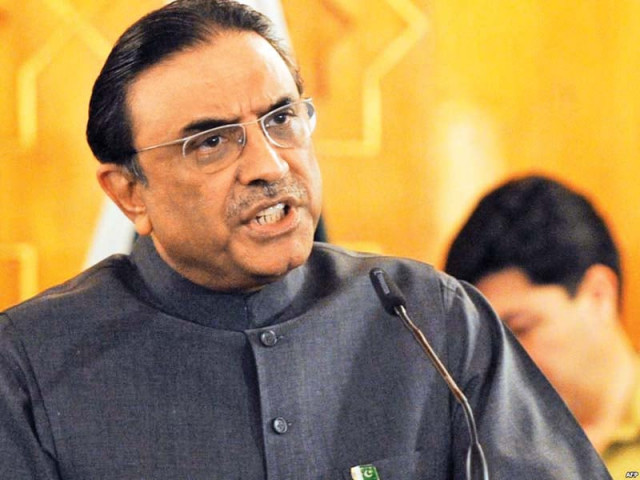Zardari challenges court jurisdiction in Park Lane reference
Prosecutor says defence using delaying tactics

The prosecutor for the National Accountability Bureau (NAB) on Tuesday began his arguments in the accountability court in the Park Lane reference against former president Asif Zardari after his defence lawyer challenged the court’s jurisdiction in the matter.
Accountability Judge Azam Khan heard the case. The proceedings on Tuesday focused on an application of defence lawyer Farooq H Naek for halting the Park Lane reference against Zardari. NAB Deputy Prosecutor General Sardar Muzaffar Abbasi objected to the petitions, saying that when the court had decided to frame charges, the application for halting the proceedings could not be filed.
Naek also filed another application, asking the court to determine whether the case fell under its jurisdiction. This led to heated arguments between Abbasi and Naek. The NAB prosecutor apprised the court that the defence was using delaying tactics.
However, the judge intervened, admonishing both sides not to “shout at each other”. The judge remarked that he would not allow anyone to shout in the court. He also asked both sides not to make the courtroom a political arena.
The judge then addressed Naek, saying that he had promised to complete the arguments on his first application and then he would decide on the jurisdiction of the court at the same time. Naek initiated arguments regarding the court’s jurisdiction on the matter.
The Park Lane case is being investigated under different sections of the National Accountability Ordinance (NAO) 1999, and the Anti-Money Laundering Act, 2010, over Zardari’s alleged involvement in extending loan and its misappropriation by Parthenon Private Limited.
To determine the jurisdiction, Naek asked the court to see whether the NAB law or the Financial Recovery Act applied to the case. He said that neither his client obtained any loan nor did he have anything to do with the Parthenon Limited.
Naek apprised the court that the NAB reference had not directly accused his client of taking loan and then defaulting on it, therefore, it could not be NAB's jurisdiction until the State Bank of Pakistan (SBP) issued a notice to the defaulter. Naek added that no SBP notice was served to Parthenon, Zardari or the Park Lane Company.
The NAB prosecutor said in his argument that there was no denial of the crime, adding that the exclusive jurisdiction of corrupt practice rested with the NAB court. In the Park Lane case, he continued, 77% of the loan was taken from the state-owned National Bank of Pakistan (NBP), therefore, it was a case of loss to the national exchequer.
The prosecutor said that a front company named Parthenon was formed in 2009 and it was registered when Zardari was the president of Pakistan. A loan of Rs1.5 billion was applied before the registration of the company, he said, adding that the Summit Bank president took the proposal to the National Bank and asking them that his bank would give 33% of the loan and the rest should come from the NBP.
The loan was approved 20 days after the company was formed, the NAB prosecutor apprised the court, adding that floors of a building owned by the Park Lane Company were placed as collateral for the loan.
He said that Zardari and his son, Bilawal Bhutto Zardari, had 25% shares each in the Park Lane Company, adding that Parthenon was a front company set up just to receive loans. A property of Park Lane was mortgaged which did not exist in actual, he pleaded.
Naek requested the court to ask NAB to share the relevant documents so that they could file the written comments. Abbasi said that NAB had not given any separate petition, it had just arranged the volume. The court adjourned the hearing till July 23, when Abbasi will continue his arguments.
(WITH ADDITIONAL INPUT FROM APP)



















COMMENTS
Comments are moderated and generally will be posted if they are on-topic and not abusive.
For more information, please see our Comments FAQ